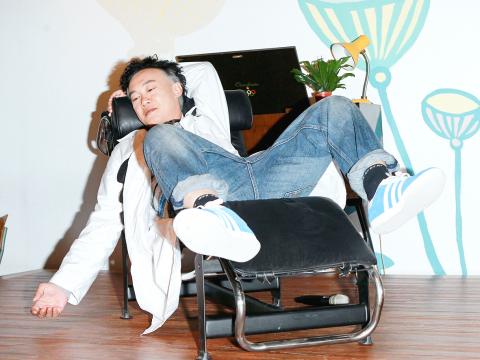Last week was an exciting time for music fans. American rapper Snoop Dogg made his debut appearance in Taiwan, where he performed with Dr Dre at Luxy, music legend Lo Ta-yu (羅大佑) led groupies to relive his 1980s heyday, and current idol Hebe Tien (田馥甄) of S.H.E crooned to a full-house audience at the National Taiwan University Sports Center.
But no one was as hardworking as Hong Kong’s Eason Chen (陳奕迅), who broke multiple records with a six-concert tour in Taiwan and still felt the urge to let off some steam.
The tour saw Chen become the first Hong Kong singer to make it to Taichung Stadium (台中體育場) and Kaohsiung Arena (高雄巨蛋). He also became the new title-holder for most shows by a Hong Kong performer during one tour in Taiwan, and attracted a record-breaking 72,000 concertgoers.

Photo: Taipei Times
At the afterparty in Kaohsiung on Saturday last week, the usually mellow star suddenly lost his cool when the Apple Daily asked him about a Hong Kong gossip media story that reported he and his wife of five years are heading for a divorce.
“Screw you. You [the Hong Kong press] are full of crap,” he snapped.
To be fair, Chen might have fueled the rumors about his deteriorating marriage when he recently appeared on Here Comes Kang and Xi (康熙來了) to promote his concerts. The star told the program’s hosts, Dee Hsu (徐熙娣, aka Little S) and Kevin Tsai (蔡康永), that he and his wife Hilary Tsui (徐濠縈) rarely talk at home and sometimes rely on text messages to communicate.
Meanwhile, things are getting hot between Jay Chou (周杰倫) and his teenage sweetheart Hannah Quinlivan (昆凌). After trying to keep their romance as low profile as possible, the barely legal model was spotted cruising around Taipei in one of Chou’s sports cars last week. According to tailing paparazzi from the Apple Daily and the Liberty Times (the Taipei Time’s sister newspaper), Quinlivan’s itinerary included lunch at the Breeze Center (微風廣場) and a look-see around Chou’s restaurant at Huashan 1914 Creative Park (華山1914), before returning to her home just one block away from the Mando-pop king’s apartment.
What surprised the paparazzi more was that Quinlivan neither denied nor admitted anything when reporters from the Liberty Times questioned her about whether or not the vehicle was a gift from Chou.
Gossip observers are saying it’s a sign that the 18-year-old model’s status as “J-wife” (J嫂) is cemented and official.
In film-related news, a pirated copy of You Are the Apple of My Eye (那些年,我們一起追的女孩) went viral online and received some 140,000 hits on YouTube within a couple of days before it was blocked on Sunday. It is said that the leak is likely to affect the film’s box-office takings when it opens in China next month.
Usually self-assured in public, the film’s director and noted writer Giddens Ko (柯景騰), better known as Jiubadao (九把刀 or “Nine Knives”), made the rare gesture of pleading to fans on his blog by saying the film is his “baby blessed with lots of love and prayers.”
Love or no love, Jiubadao’s baby is raking in a lot of dough for its creator. The romantic comedy has grossed more than NT$400 million at the box office in Taiwan and broken the NT$200 million mark at the Hong Kong box office since its release in October.

As we live longer, our risk of cognitive impairment is increasing. How can we delay the onset of symptoms? Do we have to give up every indulgence or can small changes make a difference? We asked neurologists for tips on how to keep our brains healthy for life. TAKE CARE OF YOUR HEALTH “All of the sensible things that apply to bodily health apply to brain health,” says Suzanne O’Sullivan, a consultant in neurology at the National Hospital for Neurology and Neurosurgery in London, and the author of The Age of Diagnosis. “When you’re 20, you can get away with absolute

When the South Vietnamese capital of Saigon fell to the North Vietnamese forces 50 years ago this week, it prompted a mass exodus of some 2 million people — hundreds of thousands fleeing perilously on small boats across open water to escape the communist regime. Many ultimately settled in Southern California’s Orange County in an area now known as “Little Saigon,” not far from Marine Corps Base Camp Pendleton, where the first refugees were airlifted upon reaching the US. The diaspora now also has significant populations in Virginia, Texas and Washington state, as well as in countries including France and Australia.

On April 17, Chinese Nationalist Party (KMT) Chairman Eric Chu (朱立倫) launched a bold campaign to revive and revitalize the KMT base by calling for an impromptu rally at the Taipei prosecutor’s offices to protest recent arrests of KMT recall campaigners over allegations of forgery and fraud involving signatures of dead voters. The protest had no time to apply for permits and was illegal, but that played into the sense of opposition grievance at alleged weaponization of the judiciary by the Democratic Progressive Party (DPP) to “annihilate” the opposition parties. Blamed for faltering recall campaigns and faced with a KMT chair

May 5 to May 11 What started out as friction between Taiwanese students at Taichung First High School and a Japanese head cook escalated dramatically over the first two weeks of May 1927. It began on April 30 when the cook’s wife knew that lotus starch used in that night’s dinner had rat feces in it, but failed to inform staff until the meal was already prepared. The students believed that her silence was intentional, and filed a complaint. The school’s Japanese administrators sided with the cook’s family, dismissing the students as troublemakers and clamping down on their freedoms — with